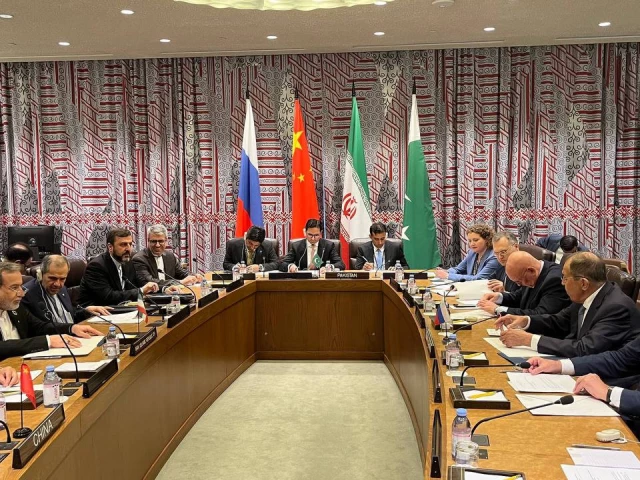Islamabad:
Pakistan, China, Iran and Russia expressed Friday “deep concern” about the presence of terrorist groups operating from Afghanistan, warning that attire as Isil, Al-Qaeda, the forbidden Tehreek-E-Taliban Pakistan (TTP), the Balocistan Liberation Army (Bla) and others continue to be threatened with regional and global security.
The four countries issued a joint statement after their fourth quadrilatric meeting on Afghanistan held outside the 80th session of the United Nations General Assembly in New York. The meeting, convened by invitation from Russia, brought together foreign ministers from the four states to review the deterioration of the situation in Afghanistan.
According to the statement, the ministers urged the Afghan authorities to take “effective, concrete and verifiable actions” against terrorist networks, including the dismantling of their training fields, reduce financing and avoid recruitment and access to weapons. They also requested the non -discriminatory elimination of all militant attire and emphasized that the Afghan soil should not be used against their neighbors or beyond.
Pakistan, in particular, has repeatedly given alarm by cross -border attacks by TTP and other terrorist groups operating from Afghan soil. Islamabad has urged the Taliban authorities to take “verifiable measures” against such outfits, warning that breach undermines regional stability.
Similarly, Iran has accused Afghan groups such as Jaish Ul-Adl of organizing attacks through its border, while China fears the presence of the Islamic Movement of Eastern Turkey (Etim), which sees as a threat to its western region of Xinjiang. Russia also is still concerned about militant networks that extend their scope to Central Asia.
The four parts also underlined support for Afghanistan as an “independent, united and peaceful state, free of terrorism, war and narcotics.” They praised Kabul’s efforts to reduce opium cultivation, but increased alarm on the growing production of synthetic drugs such as methamphetamine, asking for a regional and international coordinated action to combat narcotics traffic.
In refugees, the ministers urged the Taliban authorities to create conditions for the safe and sustainable return of millions of Afghanes displaced abroad. They praised Pakistan and Iran for organizing large refugee populations and pressed the international community to assume their responsibility through sustained financial and technical support.
The declaration reiterated requires an inclusive political configuration in Afghanistan that represents all ethnic and religious groups, while emphasizing the importance of access to women and girls to education, employment, public life and basic services.
The four countries also said that NATO states must assume the “main responsibility” for the difficult situation of Afghanistan, urging them to return frozen Afghan assets and raise unilateral sanctions. They rejected the restoration of foreign military bases in Afghanistan or its surroundings, warning that such movements would undermine regional stability.
The Foreign Ministers welcomed on current regional initiatives, including the Moscow format and the commitment of Shanghai’s cooperation organization in Afghanistan, and promised to continue with quadrilateral consultations.




